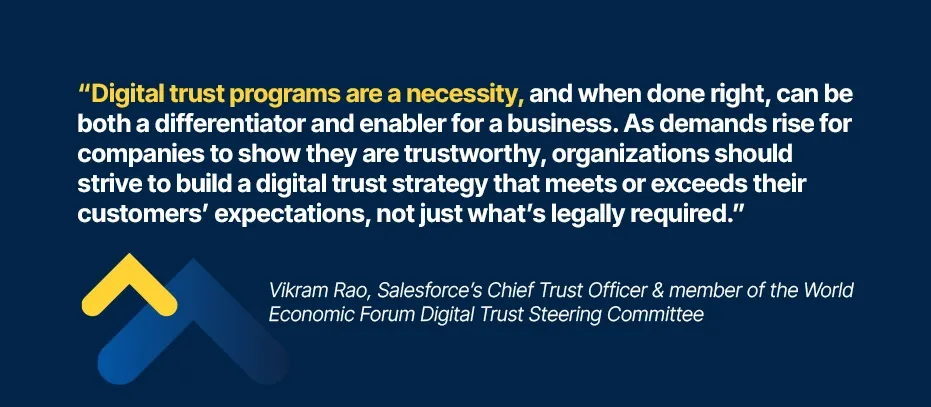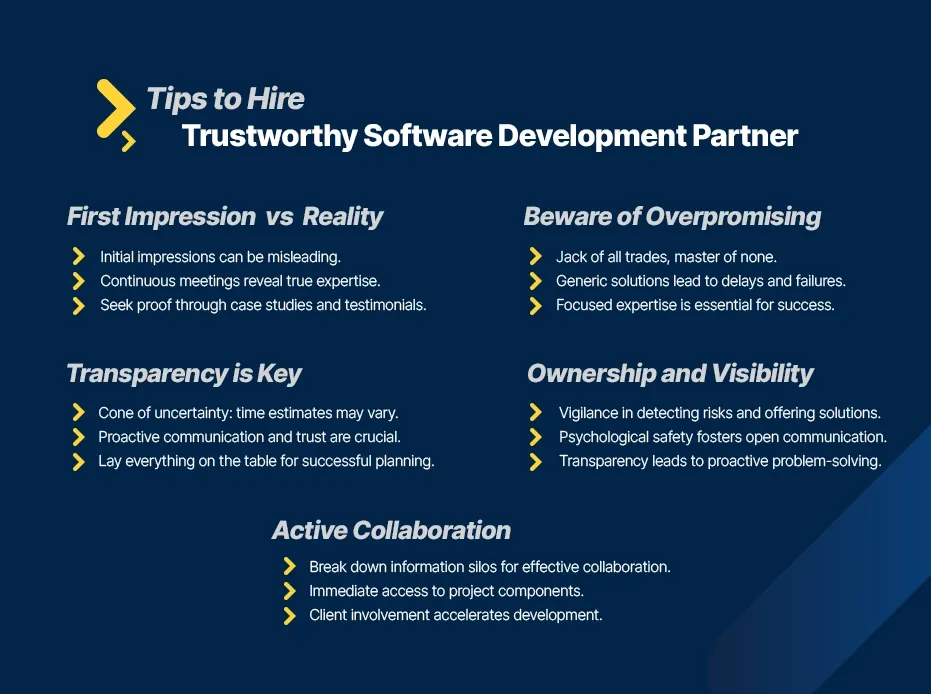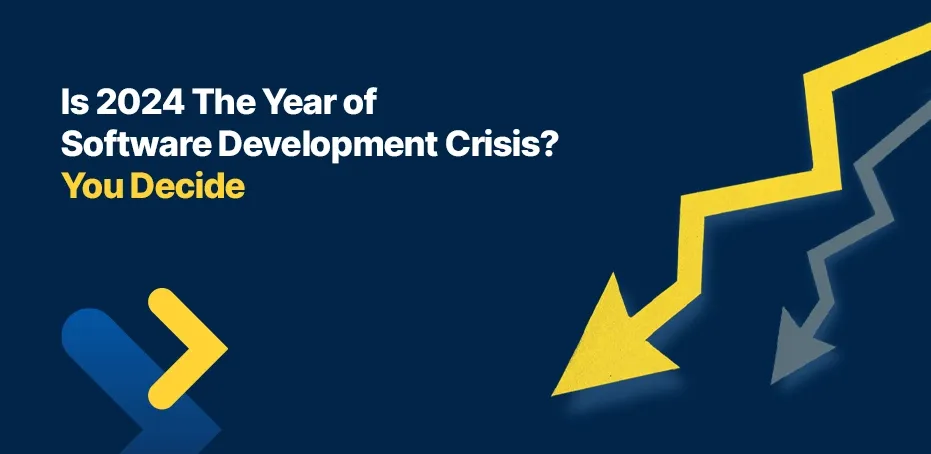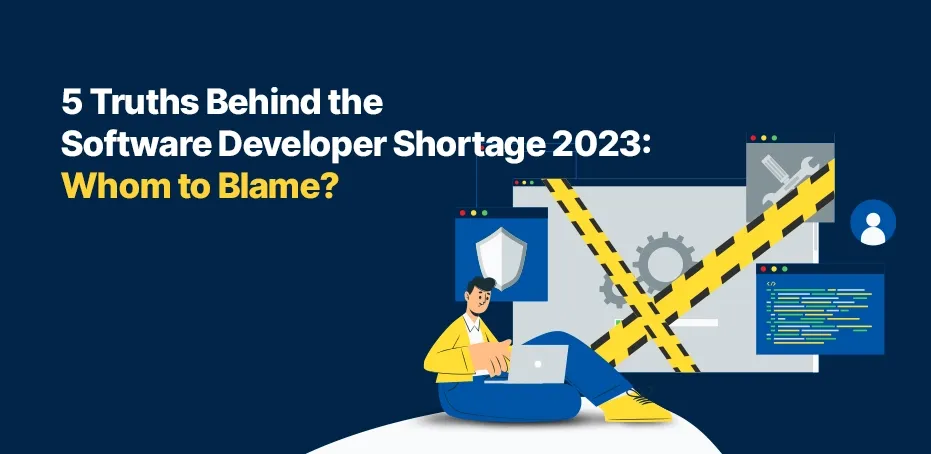Is it Difficult to Trust Your New Software Development Partner in 2024?
“Digital trust is individuals’ expectation that digital technologies and services — and the organizations providing them — will protect all stakeholders’ interests and uphold societal expectations and values.” — World Economic Forum
But do we stand true to that definition? Let’s find out.
Trust Crisis and Digital Realm
Software development companies take extraordinary measures to meet the unique business needs of their clients. Sadly, they don’t pay enough attention to one element crucial to sustaining long-term business partnerships: trust.
In the digital realm, trust is about letting a random vendor have total power over your money and ideas. You believe they won’t abuse the agreement contract, steal your confidential data or your idea for their benefit, and more.
Regardless, trust is a double-edged sword. Willingness to surrender our vulnerability also means we know our trust can be misused.
Remember the Facebook Fiasco 2018?
In 2018 Facebook CEO Mark Zuckerberg was questioned at Congress for exposing the personal data of 87 million users to Cambridge Analytica (a British Political Consultant) to target voters during the 2016 U.S. presidential election.
A month later, in September, Facebook disclosed that hackers had accessed the login information of 50 million users. By the end of the year, a New York Times investigation revealed that Facebook had given access to its users' private data, including private messages, to companies like Netflix, Spotify, Microsoft, Yahoo, and Amazon.
Facebook’s commitment to data privacy shook everyone. Besides, with 493.33 million ransomware attacks taking place in 2022 only, it's hard to trust any organization for your data and money.
Rising trust issues at the digital level can halt problem-solving and innovation.
Decoding Trust in the Software Development Sector
Lasting business relationships require commitment and consistent work quality. That said, building remote development relationships can be both confusing and beneficial at first. But as momentum grows, you find yourself working with talented developers from a different continent — at almost a fraction of the cost of hiring a full-time developer.
Talent and cost savings may be attractive, but forming a trusting relationship with your development team involves several factors such as diverse cultures, languages, local laws, online presence, interests, and more.
As Harvard Business Review discusses, “Technological solutionism — the idea that tech developers can be trusted to innovate or code our way out of problems, and into prosperity — is on its way out.”
HBR further adds, “Individuals’ trust in tech and the companies who develop it has been eroded by innumerable failures.” As a result, businesses and individuals have grown skeptical about data privacy, algorithmic biases, data theft, and the risks of unsecured devices.
Stakeholders now assess whether a software company leaders' decisions reflect their values and prioritize people's interests. And for that, every service provider must ensure trust, accountability, and transparency in all operations to maintain digital trust.

Building and winning trust isn’t glamorous. At times it involves making complex decisions and detailed legal contracts.
For a software development company, establishing trust with clients depends on cultivating strong relationships with stakeholders through consistent actions. competence, and genuine intent.
Deloitte analyzed the US tech sector by surveying end-users and B2B buyers from large enterprises holding revenues above US$500 million. Customer service quality, innovation, and security resulted as the most valuable trust-building actions. Customers reward brands that do these well and abandon those that don't.
So, if you are a startup or a growing business what you should expect from your software development partner to earn your trust?
Is Your Next Software Development Partner Trustworthy?
Earning Digital Trust is difficult.
You can’t hire a software development partner unless you trust them. Likewise, a development partner may not create business-critical software solutions unless they have the trust of their client, you.
Leaving your business in the hands of a random software development company far away is risky and nerve-wracking. Similarly, a brilliant idea is useless without a reliable software development firm.
Thus, to ensure a successful partnership built on truth and trust, consider these key measures: (These tips are helpful for both clients and software service providers)

The first impression is not the first meeting.
The phrase "the first impression is not the first meeting" underscores the importance of looking beyond initial claims. This could be a cold email or message, a referral from someone in your network, an ad, blogs, social media posts, or pure organic search.
Here's how it relates:
Initial impressions can be misleading
Software companies may present themselves as the most profound and perfect choice in their online presence or during initial meetings — showcasing their capabilities across various technologies and domains. However, this first impression may not reflect their true knowledge or expertise.
Continuous meetings may reveal their truth
A company's expertise is proven through real ongoing interactions, discovery calls, and work execution. These engagements tell a lot about their ability to keep their promises.
Seek proof of their promises
Their initial pitch or online presence may be impressive, but always seek proof through case studies, portfolios, and client testimonials. Past work and client words provide enough evidence of your prospect’s capabilities.
Do they empathize with your expectations?
Do you find consistency in their online claims and their words? When you're nervous and anxious about your business concept, do they carefully listen and offer valuable solutions? Or do they just seem desperate to grab your money?
Do a background search beyond surface claims
Don’t forget to cross-check that company's track record, leadership, team, and development approaches to understand if they can deliver their surface-level claims.
Do they offer high expertise in every technology and domain?
Jack of all trades, master of none. So, basically, when a software company claims to possess expertise in every tech, industry, and discipline, RUN! Here's why:
Overpromising is a red flag
Fallacies! It's very rare for any software development company to possess skills in every tech stack, understand the nitty-gritty of every industry, and master every domain.
Meanwhile, the tech world is becoming unipolar in terms of technology adoption. It's almost impossible to find and hire a full-fledged software development partner.
Stay away from generic solutions
When hiring a software development firm always look for a well-acquainted partner with your project type and the technology you require. Otherwise, get ready to receive tons of irrelevant software solutions that do not align with your business goals and add value to your investments.
You might be interested in reading 5 Truths Behind the Software Developer Shortage
Believing in lies may lead to delays and failures
If a company glorifies its capabilities, it's likely a misrepresentation that can lead to dissatisfaction, project delays, or even failure.
Well, even if they do…
Even if a company covers a wide range of technologies and industries, it doesn't guarantee its work quality. Without focused expertise, their solutions may lack the depth and precision required for complex projects.
Top 5 Enterprise App Development Challenges and Solutions for Leaders
Transparency is “still” the key to project planning
Cliche as it sounds but transparency is the prereq to preparing and planning your product development project which includes cost, time, team, and of course trust.
There’s no denying that setting a project scope, forecasting results, and mapping out a plan is quite difficult in the beginning. Mistakes are likely, especially during the unpredictable early development stages. Interestingly, this process is known as the cone of uncertainty.

To combat this, you’ll need to have ample and accurate information during the planning stages.
This is where transparency proves critical on your software development partner’s end.
Ensuring successful project planning requires unwavering trust between both clients and the development team, while proactive communication helps keep the business goals and milestones aligned.
Otherwise, naive project planning may end your project in a total disaster.
To achieve transparency, everyone must put everything on the table. Both parties must know their responsibilities. For example:
You as a client should carefully assess and provide the budget, project scope, requirements, planned features, and other relevant information.
Developers, in turn, should stay honest about their skills without misleading their clients to capture projects.
If you are scared to share ideas with a development team, try signing a non-disclosure agreement (NDA) beforehand with your potential developers addressing possible security and financial concerns. NDA safeguards confidential project information and outlines legal consequences for breaches.
Some reputable full-stack software development teams, like Qbatch, initiate this agreement to build good faith.
Nevertheless, full transparency is an unquestionable element for a successful yet trust-based business partnership when the stakes are high.
Do they own their mistakes and offer deep visibility?
Finding a software development team that is vigilant about detecting financial and technical risks on time and cares to communicate them with solution-driven feedback is rare. This is rooted in offering visibility into every moving part of the project — allowing enough time for each problem to avoid larger costs later.
Visibility is a prerequisite to building a crash-proof, stable, and bug-free app without breaking the bank.
the 1-10-100 Rule states that bug fixing in the early development stages is cheaper. Imagine, just after launching your software product a terrible functionality bug appears — users have already started using your app — and you’re now questioning your choices. A nightmare. Your reputation and money are both at risk.
The image explains the need for visibility from the start, otherwise, the consequences become unhandy.
Read In-depth Guide to Custom Software Development Costs
Cost of prevention vs. cost of failure
To mitigate any cost risks, look deeply into your partner’s team culture. Ensure that they foster a culture of psychological safety where team members feel comfortable sharing their problems and mistakes; without fear of punishment or shame. In such open environments, team members are more likely to speak up about issues they encounter or mistakes they have committed.
However, when psychological safety is lacking, individuals may not accept problems or even actively conceal mistakes until they become uncontrollable. This stems from a fear of blame or punishment. To fight this, managers and senior leadership must stay transparent about challenges and issues affecting the project.
This includes sharing critical information with teams, no matter the frustration or discomfort. For instance, if the market audience begins to dislike a feature your team is devotedly developing, your software development leadership must tell their teams straight away.
Besides, even with the most diligent and highly skilled engineering team, unforeseen events may occur.
Insisting on transparency, especially during tough times is uncomfortable. But for a proactive, problem-solving team dynamic, it’s one crucial requirement. Otherwise, keeping secrets is suggestive of a lack of transparency and possibly an untrustworthy approach — and a total red flag to begin with.

You become part of their team
Digital trust demands effective collaboration. But information silos are possibly the biggest obstacle to active collaboration. Sadly, most software development teams keep their data (actually yours) contained and restricted within their circle.
For instance, no demos before releasing the final product.
This slows down collaboration. It’s crucial for the team and you as their esteemed client to work in close collaboration and analyze your product’s performance before it hits the market.
Ensure that your partner commits to give you immediate and complete access and visibility to relevant information, documentation, codebase, test cases, and every project-related component.
Trust and transparency isn’t just about freedom of information. It’s also staying on the same page and knowing where the project is heading. This also helps you keep track of any bugs, project progress or delays, financial risks, technical debts, and more.
The best software product development teams are usually the most inclusive. You are an important part of their team. They give you access to all docs and files and complete task transparency via team management boards such as Trello, Atlassian, Asana, Zoho, and more.
Regular client involvement facilitates project buy-in, leading to quicker feature approvals and accelerated development. Adopting Agile methodology is an effective approach to achieve closer collaboration.
You might also like…

Is 2024 The Year of Software Development Crisis?

5 Truths Behind the Software Developer Shortage 2024: Whom to Blame?
